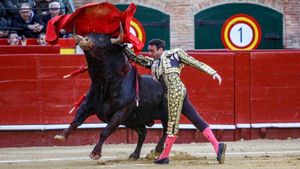Juliusz Kulesza, known as "Julek," passed away at the age of 96, leaving behind a legacy marked by bravery and artistic contribution. Kulesza, who was deeply involved during the Warsaw Uprising, is remembered not only as a soldier but also as an accomplished graphic artist and author.
Born on May 19, 1928, Kulesza's formative years were spent during World War II. He took part in the Warsaw Uprising at the tender age of 16, demonstrating courage far beyond his years. Famed for his role as part of the Polish Home Army (Armia Krajowa), he was instrumental as a soldier under the unit known as PWB/17/S, defending the Polish Security Press Factory (PWPW) against German occupiers.
His involvement on the front lines began on August 2, 1944, during the takeover of PWPW. He fought courageously until August 28 of the same year, when the Stare Miasto (Old Town) fell, leading to his capture and subsequent escape from the transitional camp known as Dulag 121. His military service earned him the esteemed Krzyż Walecznych (Cross of Valor), which recognizes the bravery of soldiers who willingly risk their lives for their country.
After the war, Kulesza pursued his passion for art, graduating from the Academy of Fine Arts (Akademia Sztuk Pięknych) with a degree in graphic design. Kulesza became well-known for his over 800 commissioned works, showcasing his skills across various platforms. His work extended beyond graphic design to writing, where he authored nearly twenty books centered around the themes of the Warsaw Uprising and Polish history during the Nazi occupation.
His notable works include titles such as "Starówka. Warszawskie Termopile" and "Z Tasiemką na czołgi," which reflect his dedication to preserving the memory of his experiences and those of his fellow combatants. He contributed to the Encyclopedia of the Warsaw Uprising and was often invited to participate in documentaries discussing the topic.
Throughout his life, Kulesza received numerous accolades for his contributions to history and the arts. He was awarded the Krzyż Oficerski Orderu Odrodzenia Polski (Officers' Cross of the Order of Rebirth of Poland) and recognized as Honorary Citizen of Warsaw, among other honors. These accolades reflect not just his participation as a soldier but also his lifelong commitment to educating future generations about the significance of the Warsaw Uprising.
His passing was met with mourning across Poland, particularly from institutions like the Museum of the Warsaw Uprising, which encapsulated the nation's sentiments on social media, stating, "Z ogromnym żalem informujemy, że na wieczną wartę odszedł Juliusz Kulesza ps. Julek. Serdeczny przyjaciel Muzeum Powstania Warszawskiego." (With great sadness, we inform you, Julek has passed away, dear friend of the Museum of the Warsaw Uprising).
Reflecting on his experience, Kulesza once said, "Dla mnie najważniejsze z samego Powstania, jako mojego doświadczenia życiowego, to nie są ani aspekty militarne, ani polityczne. To jest to, że człowiek w pewnych momentach potrafi się wznieść ponad siebie" (For me, the most important aspect of the Uprising, as part of my life experience, is not the military or political dimensions. It is how, at certain moments, one can rise above oneself). His insight speaks to the core values of resilience and sacrifice, which defined not only the Uprising but the Polish character during those troubled times.
Juliusz Kulesza's legacy will live on, not just through his artistic works and writings but through the deep impression he left on those who looked to him for wisdom and inspiration. His narrative, woven through with themes of freedom, sacrifice, and the human spirit, continues to resonate with people today. His final years were spent living as a hero not just on the battlefield but also as a guardian of Polish memory.
He will be remembered deeply not only as the last living defender of PWPW but as one who exemplified the unyielding spirit of the Polish people during some of their darkest days.



